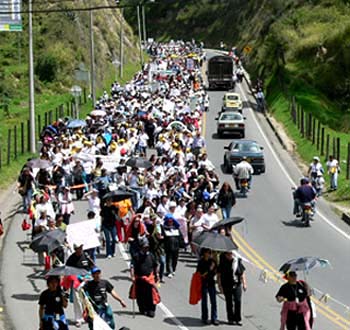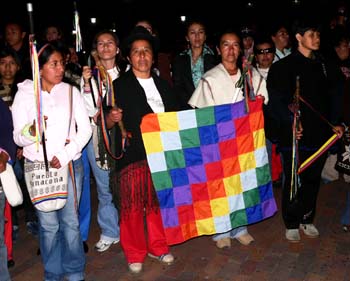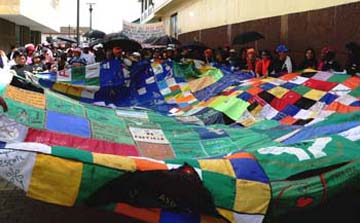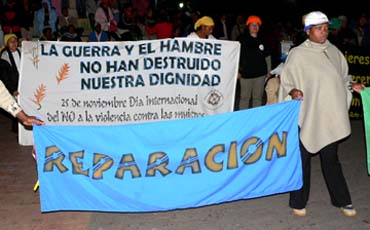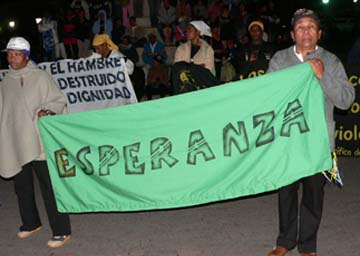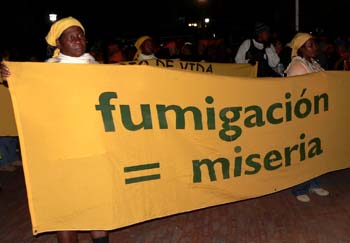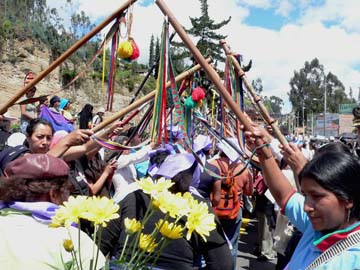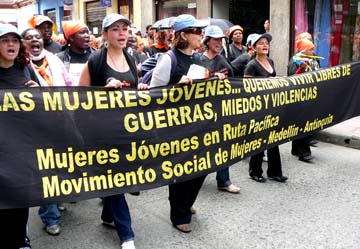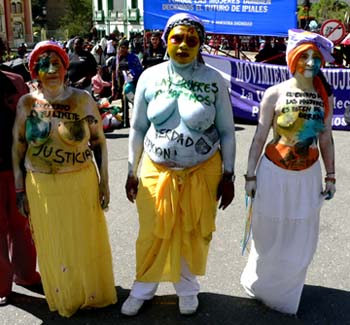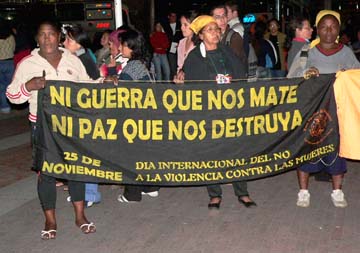|
NOVEMBER 2007 |
|
MASSIVE
BI-NATIONAL MOBILIZATION OF WOMEN
CALLS FOR
VISIBILIZATION OF WOMEN
By Margaret Thompson
& Katerina Anfossi Gómez “Women’s bodies are not booty for the war” Determined to visibilize the ravages of the ongoing war and militarization on women’s lives and bodies, over 4,000 women from all over Colombia mobilized and marched to the southern Colombian-Ecuadorian border on November 22-23, 2007 to meet over 500 women peace activists from the other side.
Called the Bi-National Mobilization of Women at the Colombian-Ecuadorian Border, the event included a rally and the next day a march that stretched over a mile through the city and mountainous countryside outside of Impial in southwest Colombia. Thousands of women and some men participated, including indigenous, Afro-descendants and white women who were aged and young, some walking the 11-kilometer route with canes, others carrying banners or hand-painted posters with slogans that declared, “We as women will not give birth nor raise sons and daughters for the war,” and “All forms of violence against women are political.” Housewives, peasants, trade unionists, students, displaced women, activists and academics, all declared that “we are uniting our voices and bodies against the militarization, displacement, and deaths…We call for truth, justice and reparations.”
Comprised of more
than 450 organizations and networks, the Ruta Pacifica de las Mujeres
(Women’s Peaceful Way) and the Organización de Feminino Popular
(Feminine Popular Organization) organized this historic march to the
international bridge at Remichaca on the border of Ecuador with the
slogan, “Militarization = Violence.” This symbolic meeting on the
Colombian-Ecuadorian border, a site of intense armed conflict, was also
attended by officials from both governments, who formed a bi-national
working group with women peace activists to begin to address many
problems in the zone related to the armed conflict.
Olga Lucía Ramírez of the Ruta
Pacífica of Antioquia told FIRE in an interview that the Women’s
Movement Against the War has mobilized several times since 2000 to offer
support and solidarity to women in a different zone of the country each
time, who have suffered from intense armed conflict in their area. The
2006 mobilization took place in Chocó (see FIRE reports at:
http://www.radiofeminista.net/colombia_indice.htm).
This year, the organizers chose the border site to raise awareness about
the 250,000 persons (more than half women and children) who have fled to
Ecuador away from the armed conflict in Colombia. “We want to make
visible the fact that the internal armed conflict in Colombia has had a
serious impact on countries near its borders.” However, “Colombia
doesn’t admit that it has an armed conflict.”
Critics of Plan
Colombia including Sarah of the Christian Peacemakers Group also told
FIRE that it has been a failure, creating serious problems with people’s
health and the environment, and doing little to eradicate coca
cultivation.
Gloria of Ruta
Pacifica de las Mujeres (Women’s Peaceful Way) of Colombia said
that the Women’s Movement Against the War had repeatedly called for
alternative political solutions to the war that include
negotiations. However, President Uribe (supported by millions of US
dollars with Plan Colombia), has ignored such alternatives and instead
has funneled money toward armaments, military personnel and training for
conflict areas, resulting in the escalation of militarization and
violence in daily life. FIRE traveled from Costa Rica to accompany the Bi-National Women's Mobilization, which was also designed to commemorate the International Day for the Elimination of Violence Against Women on November 25th.
Women, who are already the poorest of the poor and highly vulnerable due to patriarchal oppression and subordination (as in many countries), have faced escalating violence including sexual violence and torture in the armed conflict that has plagued Colombia for more than 40 years. “Women’s bodies have been used as the booty of war, with sexual violence converted to a weapon to defeat the enemy, as a mechanism of social control, or as a means of punishing women for their political work and to force them to return to their “place” in the private sphere,” according to the organizers of the event. They presented evidence that women are held as sexual slaves and forced prostitutes.
Organizers welcomed participants at a rally on the evening of Nov. 22 by declaring, “In political contexts of repression, torture, forced disappearances, assassinations, impoverishment, curbing of civil liberties, we as feminists and women have taken the streets, the nights, the walls of cities and towns, and from there exercise our sacred right to rebel and defy the patriarchy. We will take back our daily lives, bodies, and the pain produced by our experiences of violence.”
Banners and also several speakers made the connections between violence, militarization and neoliberalism, calling for women’s resistance to the exploitation of land by transnational corporations, extraction of natural resources and biodiversity, proposed construction of an oil pipeline stretching from Venezuela through Colombia to Ecuador, and plans to build an inter-oceanic canal as an alternative to the Panama Canal. As one banner carried in the march declared, “Neither the war will kill us, nor will peace destroy us.”
"Neither war that
kills us, nor peace that destroys us"
Read a short summary of Plan Colombia
Find numerous FIRE
reports on the Colombian women's peace movement at:
SOURCES: Amnesty International Report on Colombia "Manifesto Against All Forms of Violence Against Women," by the Feminine Popular Organization of Barrancabermeja & the Ruta Pacifica de las Mujeres (Women’s Peaceful Way) “Militarization = Violence Against Women,” paper by the Feminine Popular Organization of Barrancabermeja & the Ruta Pacifica de las Mujeres (Women’s Peaceful Way)
|
You
may use the images, texts and audios, citing as the source
FIRE - Feminist International Radio Endeavour (www.radiofeminista.net)
 FEMINIST INTERNATIONAL RADIO ENDEAVOUR
FEMINIST INTERNATIONAL RADIO ENDEAVOUR